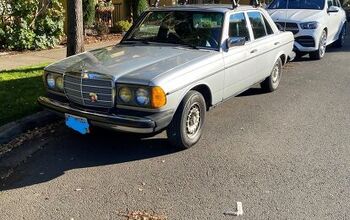Toyota, Honda Prepare to Eat Detroit's Lunch
Automotive News [AN, sub] reports that The Big 2.8 are responding to the general downturn in the U.S. new car market by slashing first quarter production– and beyond! CSM Worldwide says Chrysler will cut factory output by 15 percent, GM will cut production by 10.6 percent and Ford will cut trim throughput by seven percent. Models set for cutbacks include GM's [supposedly] hot selling Lambda crossovers (including the vaunted Buick Enclave), Dodge pickups, Jeep Grand Cherokee and Commander. Once again, the spinmeisters are blaming the downsizing on their determination to wean themselves off fleet sales. Chrysler CEO Boot'em Bob Nardelli has promised to trim fleet sales from 30 (yes 30) percent down to (just) 20 percent. Meanwhile, the transplants are preparing plans to boost production. And that means Toyota and Honda are about to grab yet more market share from Detroit. "Toyota President Jim Lentz said the company expects to boost U.S. sales 3 percent next year. If industry sales reach 15.6 million units in 2008, Toyota's market share would rise to 17.4 percent… Honda continues to gain share, too. Last week, American Honda Motor Co. President Tetsuo Iwamura told reporters the company expects to boost U.S. vehicle sales 2.5 percent. Assuming industry sales of 15.6 million units, Honda's market share would rise to 10.2 percent." And so it goes.
More by Robert Farago


































Comments
Join the conversation
Here’s a look at the major midsize players through November 2007, with a comparison to the same period last year (courtesy of aiada.org): Toyota Camry (including Camry Solara models) – 434,277 (+5.8%) Honda Accord – 360,976 (+10.8%) Chevrolet Impala – 293,328 (+11.2%) Nissan Altima – 259,611 (+24.6%) Toyota Prius – 167,009 (+70.4%) Ford Fusion – 136,007 (+4.8%) Pontiac G6 – 132,894 (-7.6%) Hyundai Sonata – 120,696 (-13.4%) Chevrolet Malibu – 116,140 (-23.8%) We already know the story with most of these models. But one thing that's really shocked me is the abysmal performance of the Sonata. If you take out the fleet sales which account for close to a quarter of it's sales, the once crowned Camry killer may actually have fewer than 100,000 retail sales this year. Oh, and my four year old son just wants to say 'Zaboomafoo' and has requested that he sees him ASAP. Any chance of having him test drive a 2008 Passat?
Toyota and Honda could easily move 5%-10% of their product into fleet sales without hurting their residuals and without giving bargain basement prices to the fleets. A 0.5-3 year old Honda or Toyota retains significantly more of it's value than does a similar Ford, GM or Chrysler product. The crime of it all is that as Detroit retreats from fleet sales the Asian makers are stepping in and picking up that business AND doing so without hurting their retail customers (residuals!) and without killing profits. When it is all over the Retreat From Fleet by the 2.8 will not look like brilliant strategy, but as another wrong answer to the wrong question.
Businesses is not a rational game as its first source of energy and direction for success. Business is propelled by attitude, conviction and emotion, with the rational factors applied to channel and maximize the impact of those human factors. The car business is a grow-or-die business and no automaker has escaped this. It was scarcely 10 years ago that Ford was poised to overtake GM's market share in the US. At the time, when asked about that threat, GM's management claimed they weren't in business to chase market share but instead profitability. A few years later, when Ford's surge had tanked, Bill Ford and Mark Fields said over and over that they are looking for profitability and were prepared to let market share fall where it may. I knew both companies would suffer further declines and setbacks with these pronouncements. Profit without growth builds very little sustained value into a company, but it can pay dividends. Growth without profit tends to make you valuable to someone, if not so much to yourself. Sometimes a consolidation of prior gains is needed, but in this case we're instead witnessing the consolidation of prior losses. IT IS UNACCEPTABLE for these companies to willingly cede market share. If they lose it in a fight, that's one thing. To not fight for it at all is a failure of heart and will and it's disgusting, given the stakes. However weak some folks here view the product lines of the Detroit 3 and their role as assets or liabilities in these companies defending their turf, there are many options short of burning more money. What GM and Ford burn in marketing can be deployed with much more effective creative representation of products. The money can also be allocated to give some promotional coverage to absolutely everything they sell. Warranties can be extended. They can field obmudsmen to dealerships to resolve problems on the spot and to needle wayward dealers to improve merchandising, services and customer practices. If these companies just got to break-even or close, but were on a serious war footing and regaining market share a couple of tenths of a point at a time, the effect on their valuations and their ability to move the psychology of the market more in their direction strengthens more than if they cede share but suddenly became predictably profitable. But to a risk-averse mindset, the appeal of settling back into a "safer" state of profitability is powerful. Unless the Detroit 3 can only see their destiny as specialty manufacturers, with full-scope market participation off the table, they must fight for market share. We've seen that it's easy to let share shrink. It's way more difficult to win back share with equal speed. Only if the profitability gained by shrinking the business results in an overwhelming war chest for intense and broad-based product development, revamp of business practices, massive marketing to undo perceptual damage, etc., is there a chance that shrinking is a good first step. Every weakness we've seen in the domestic automotive companies traces not to product itself, but to failure of will on the part of leadership behind those errors, right up to the boards. These are huge companies, weak on market cap, burdened with legacy agreements and operating in an environment of consumer apathy and government disinterest in their health. It's up to them to change that, and ceding market share is the antithesis of overcoming apathy. These companies are also sitting on huge talent pools across disciplines, that are not effectively channeled. GM might be breaking through in this respect, given the similarities in strides evident in multiple vehicle model upgrades, but it's too soon to know whether work and authority is flowing to the talented, or whether talent leverage depends upon a few senior managers keeping their jobs. That is to say, is there institutional change or does the train start slipping backwards if Bob Lutz, Jim Press or Alan Mullaly get struck by a bus? Winning companies don't cede market share without a fight, regardless of their search for profit. Profitable growth is the long term imperative. Growth is the immediate mandate. Phil
I think growth can mean smarts, brains, ie. skill. Also product improvement, and company policy. The degree with which one can find his/her way through (the difficulty of) situations is the true persons/companies growth. The objective (sustainability) is one thing, the goal (progress) another, and what will/might work another. Happiness is what we truly all want, and to progress in learning what works to have/feel/embrace happiness (love). Money alone is not a worthwhile way of life, It alone will not inspire anyones motives, and I believe it will be reflected in the dynamics of ones choices. Half the cup is full. Revenue has been used for progress, as well as to reveal areas that need growth (mistakes). Comparing the companies to one another through similarities in history is only one way to observe a companies progress. Its only one way to take inventory of the value of its operations. Third party perspective does not define a company, only a part of it.